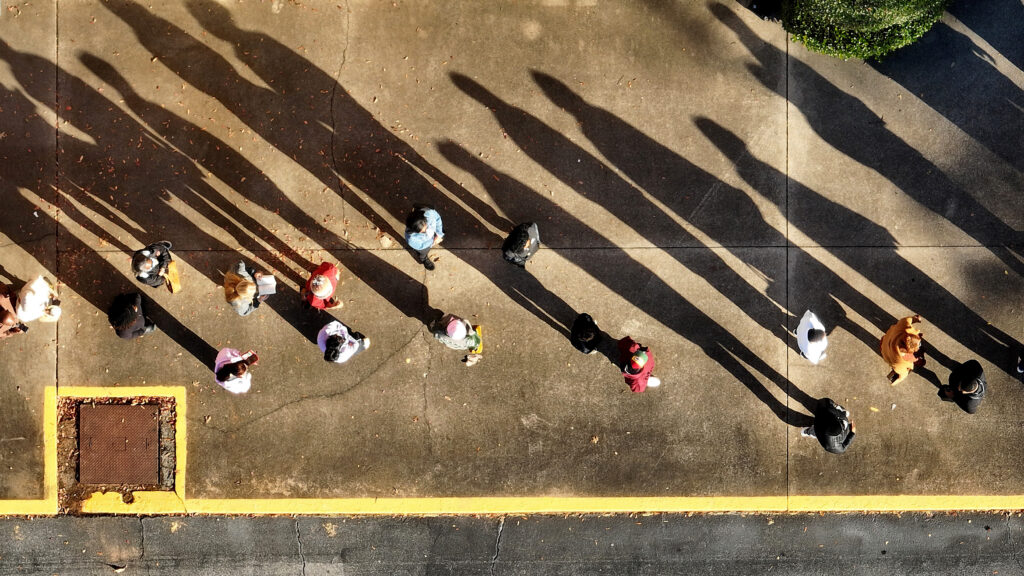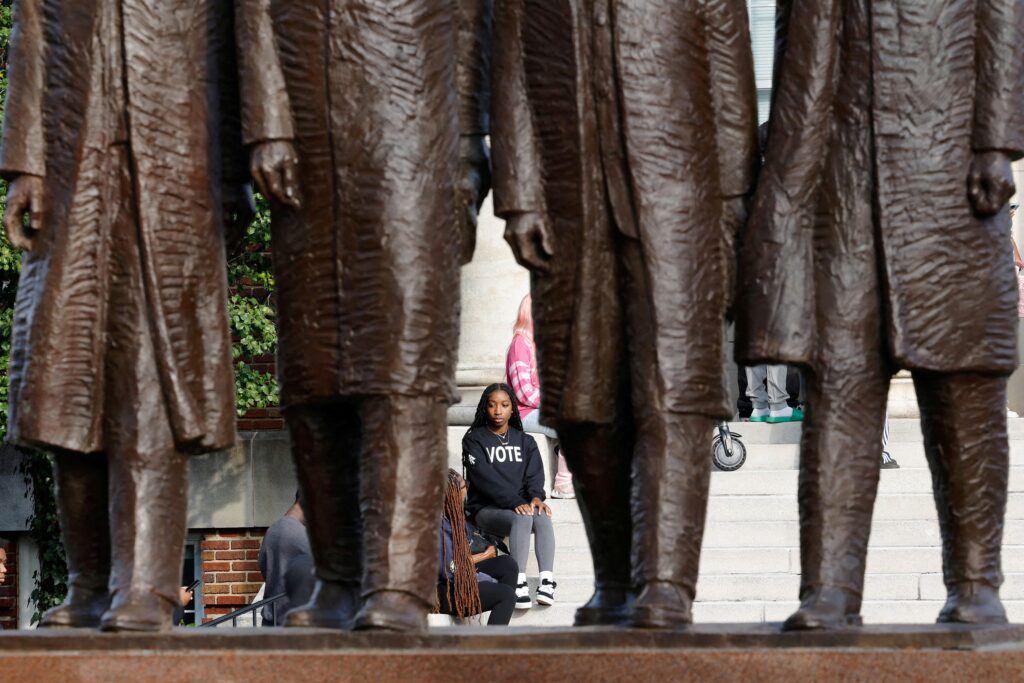A Ballot and a Last Breath

In early November 2012, I was a volunteer election observer in Massachusetts for the Lawyers’ Committee on Civil Rights Under Law. The job involved visiting polling stations in the Boston and Sommerville area to ensure there were no breaches of the electoral code, like voter intimidation or campaigning near the stations. I was a lawyer in training then, and it was a chance to watch the nuts and bolts of the U.S. electoral machine up close. I am a Kenyan, and here I was on the other side of the many lectures on the nature of democracy that people like me, from the Global Majority, are routinely subjected to.
I’ve written about that experience at length elsewhere: It ended up being a little more tumultuous than I had anticipated. The short version of the story is that at one polling station an elderly Black gentleman hooked up to an oxygen tank collapsed as he was making his way back from casting his ballot. I helped his family get him into an ambulance, and later that evening, when I called to check in on him, I found out that he had died. That such a frail man would so insist on voting in person was a powerful reminder of what the act itself still signified to a generation of Black, or Native American, people. I thought he might be in his 90s, which meant that as a young man he would have had to navigate the racist restrictions that were commonplace until the Voting Rights Act of 1965, designed to block formerly enslaved people and their descendants from even participating in elections.
I don’t practice law in the strictest sense anymore, but elections continue to animate my work. I’ve supported various institutions in their elections-related activities, co-edited a collection of essays by Kenyan women on the role of gender in electoral politics and helped the Electoral Commission of South Africa and the Association of African Election Authorities develop guidelines for the use of social media in elections in Africa. I have witnessed displays of sacrifice and immense faith in the process, as in Massachusetts or in the independent, citizen-led audits of the 2017 election in Kenya. And I have witnessed doldrums of despair, after the U.S. Supreme Court gutted the Voting Rights Act that had protected the rights of Black Americans or after yet another stolen Kenyan election. During all of these events I saw growing tensions between what elections mean to those who cast ballots, those who manage elections and those who benefit from the outcomes.
The current U.S. election campaign exemplifies these tensions in a remarkable way. The two leading candidates could not be any more different. On the one hand is a professional Black woman who has made a name for herself as a prosecutor and yet waffles when asked to defend the basics of international law. After being accused of disappearing from public view during Joe Biden’s presidency, Kamala Harris swooped in to save the Democrats from what appeared to be his doomed pitch for a second term. And while she and her pick for vice president, Tim Walz, have demonstrated savvy in appealing to their base, their popularity with swing voters is capped by their unwillingness or inability to contend with core issues that drive several groups: the genocide in Gaza, climate change, the crippling costs of higher education in the United States.
On the other hand is a candidate who makes a mockery of both elections and the presidency itself. Donald J. Trump—that “J” might as well stand for “jester”—a man convicted of sexual misconduct and numerous felonies and credibly incriminated in a possible coup d’état, has been canvassing the country to dispense his racist diatribes. He has already proved that he will put state power behind his prejudice and his threats: He did just that the first time around with the so-called Muslim ban and by detaining migrant children—in cages. Even if he weren’t the candidate of hate, Trump’s capacity for being president again is now as much in question as Biden’s, with his brain freezes and outlandish claims about immigrants eating pets. And yet he remains the candidate of choice for big business, because he promises to lower taxes and undo the administrative state. All in the name of protecting the fetish of growth at all costs and of profits over people. Neoliberalism is the handmaiden of fascism.
As a Kenyan, I have been witnessing the slow but almost certain destruction of my own country under an administration accused of abducting its opponents and firing on protesters on an unprecedented scale. Yet I do not envy U.S. voters. Their two presidential candidates are not equivalent, but having to choose between them nonetheless must trigger a sort of despair: Take your pick between a hatemongering demagogue and an establishment candidate who promises more of the same—even though more of the same means spending more on foreign wars than education at home.

From outside the United States, some of us worry about a Harris presidency for many reasons, not least because it lacks a clear foreign policy. This is a systemic problem within the Democratic Party, but Harris has proven less capable than most of making her positions on international affairs known, much less getting them amplified. In a normal election against a normal candidate, Harris would be rightly faulted for treating the rest of the world as a mere backdrop for realizing the United States’ ambitions. Such a failure might have gone unnoticed 30 years ago, before social media, but today, when the plight of Palestinians and the climate crisis animate conversations around the world, it is glaring.
The Harris campaign seems to have completely misread what the Palestinian fight for self-determination means to many non-Western parts of the world—or perhaps it doesn’t care? Nelson Mandela once said, “our struggle for freedom is incomplete without freedom of the Palestinians.” To me and, I think, to many others in the Global Majority, the struggle of the Palestinian people is not a war; it is a fight for decolonization that unites histories across Latin America, Africa, and Asia. The international human rights system promised that we would never have to go back to a world run on conquest and domination. But the Harris campaign, by failing to even criticize senior Israeli government officials who have incited genocide, is undermining people’s faith in the system itself. Decolonialization struggles are no less global than the hegemonic ambitions they aim to subvert, invert. Just as the United Kingdom and Spain once tried to create empires that stretched across the world, so, too, people stretched across the world have repeatedly resisted their imperialism. Today, Palestinians’ struggle for self-determination, even survival, is not an abstract thing happening somewhere over there.
The foreign policy of the United States rests far more on how the country is perceived around the world than the Democratic Party seems to realize. The country cannot fight and coerce its way everywhere: To maintain its standing, it needs a critical mass of the world’s population to believe its pitch about democracy and human rights. But that belief has been critically undermined by the United States’ own actions. The belligerents in Sudan are refusing to listen to the U.S. special representative, and more and more nations around the world are coalescing around Russia in open defiance of the West’s opposition to Vladimir Putin’s war in Ukraine. Juntas in Burkina Faso and Mali point to U.S. support of Israel as an act of Western imperialism and as an excuse to draw closer to Russia and China.
Human rights and civil society organizations in various nations are also watching, as the legal instruments they rely on come under great stress. In Gaza, the Geneva Conventions’ protections for civilians, including journalists and medical personnel, are being violated again and again, and that leaves those of us at the frontline of human rights struggles around the world vulnerable. We have no armies of our own; the only power we have to compel principled behavior from the governments that oversee our lives is to point to standards of conduct that other governments are being held to. That Harris the presidential candidate—and the ex-prosecutor—equivocates on demanding that Israel abide by international criminal law or international humanitarian law endangers the whole world.
Elections have always been a moment for voters to push candidates to embrace various policy positions, so it is unsurprising that U.S. voters organizing around the Uncommitted National Movement are now trying to get the Democratic Party to promise more accountability for the crimes being committed against the Palestinians. What has been surprising is the backlash against this effort, including the idea within the Harris camp that refusing to toe the party line is tantamount to endorsing the Trump campaign. Electoral politics in the United States today are a contest not between the left and the right but between the center right and the far right; between maintaining the status quo despite all its downsides and shifting the entire nation toward fascism. But this is a false choice, and it takes the luster off the notion that elections are the pinnacle of the democratic process, especially when there also is a true appetite for leftist policies, like single-payer healthcare or increased funding for education.
Trump is a dangerous demagogue who is undoubtedly worse for the world than is Harris. He made clear during his first term that his interests oscillated between using U.S. power to bully other nations or to increase his personal wealth. I’m fascinated by the fact that much of the U.S. media fail to call so much of what Trump does by its name: corruption. He has forced secret service personnel to stay at his hotels at inflated prices; he has rewarded political acolytes with ambassadorships and judgeships, and immediate relatives with senior government roles. Whenever a new Trump scandal emerges, I joke that “it is only corruption when Black and Brown people do it; otherwise it’s just sparkling lobbying.” From where I stand, it seems that the U.S. establishment media have been reluctant to hold him accountable the way they do our politicians who operate in far more complex situations.
In other parts of the world, some people have bought into Trump’s particular brand. His anti-establishment posturing appeals, particularly to young men to whom he presents a road map to escape the waithood that increasingly characterizes the prospects of youth worldwide. He promises a world that prizes brute force over diplomacy and basic decency, that acts first and thinks later. Many people today are more educated than their parents yet are facing a bleaker future than their parents did. They have more money but it is worth less; they are too educated for agricultural jobs, which jobs are disappearing anyway as land is being exhausted by the climate crisis. Trump, in his ghost-written biography and elsewhere, presents to these young people an apparent path toward wealth: the idea that surmounting one’s circumstances takes not luck or privilege but hard work and smart moves. In another sneaky manifestation of the false promise of neoliberalism, wealth replaces community or connection as the ultimate aspiration.
Trump talks like he is anti-establishment, in an unfiltered way, yet he, too, is an establishment candidate. He certainly is the candidate of big business and technologists rankled by the reach of the administrative state and its agencies. His appointments to the Supreme Court have helped dismantle the jurisprudential doctrine that required lower courts to defer to administrative agencies’ interpretations of ambiguous laws. The oil and gas industry would welcome Trump back because his last administration hobbled the Environmental Protection Agency. And since that time, Lina Khan, Biden’s appointee as head of the Federal Trade Commission, has positioned herself as a consumer advocate and taken on tech companies, including on hard-to-cancel rolling subscriptions and opaque terms and conditions.
And then there is Trump’s overt misogyny. Listen to the way he speaks about Harris, the women who have worked for him, even his wives. The only woman he seems to spare of his contempt is his daughter Ivanka. How does his conviction for sexual assault not disqualify him from the presidency? Partly because of the way the world treats women who accuse men of sexual violence, but mostly because Trump is a great vehicle for a coalition of diverse interests. Big business wants him to dismantle the administrative state. Conservative Christians want him to overturn remaining protections on abortion and access to sexual and reproductive health. Foreign governments want him to undermine the United States’ geopolitical strength, possibly even the country’s very integrity.
Where does this leave the U.S. electoral process? As a person who works on elections, I think there are bigger questions on the table than Harris versus Trump. The first one is: Is it time for the United States to move beyond two-party politics? For the Democratic Party the greater risk isn’t so much a Trump victory than its own failure to garner a suitably mixed coalition of supporters. A meaningful left has been coalescing in the United States for some time now, and it is unclear how much longer it will tolerate the Democratic National Convention’s tight grip on who gets to be the party’s top candidate. As Republicans move further to the right, strategists in the Democratic Party chase them in that direction, leaving behind the voters who are hankering for a party that offers something else.
The second question is about the nature of elections themselves, partly because they require more and more money. Elon Musk, the billionaire owner of X, Tesla and SpaceX, has become a quasi-spokesman for the Trump camp, using his tremendous platform to disseminate his own often racist and sexist rants. Large lobbying groups are shifting voters away from local priorities and local elections, where more progressive or third-party candidates might have a better chance of breaking through. AIPAC, the American Israel Public Affairs Committee, has spent tremendous resources unseating progressives who defend Palestinian rights, like Jamaal Bowman, a representative from New York, and Cori Bush, a representative from Missouri. And yet in 2022 when Representative Rashida Tlaib of Michigan—one of the few Palestinians ever elected to Congress—pushed back from her own party and raised funds within her community, she won by a landslide. But that’s the exception. With every cycle, politicians, lobbyists, and other interests salivate over the profits to be made. And the negative practices perfected on that side of the world then travel to another. Recall the career of Paul Manafort, one of Trump’s earliest lobbyists, who counted Viktor Yanukovych of Ukraine, Jonas Savimbi of Angola, and Mohamed Said Barre of Somalia as former clients.
As I grow older doing this work, I appreciate more that voting and elections actually are two separate things. For many in the Global Majority, voting, which was long denied to them, is a sacred act. For others elsewhere, elections increasingly are a business.
Back in 2012 when that ailing elderly Black man came into that Massachusetts polling station where I was an observer, he wasn’t intending to cast a ballot. He was there to escort his wife and planned to wait for her in the car. Then he said he wanted to get closer to the entrance. For a time, he and I sat together just outside the voting area, making small talk, while his wife went inside to vote. When she came out, he suddenly took a big whiff from his oxygen tank and said he wanted to vote, too. She worried, but he insisted. They went inside and cast his ballot. He came out winded. He took a moment to collect himself—and the moment dragged on because the air wouldn’t come to him. He urinated on the floor while he gasped. The ambulance arrived swiftly, and he was taken away.
To many in the world, voting is hallowed and even to some, worth risking one’s last breath. Can the people who run in those elections rise to honor that commitment?


